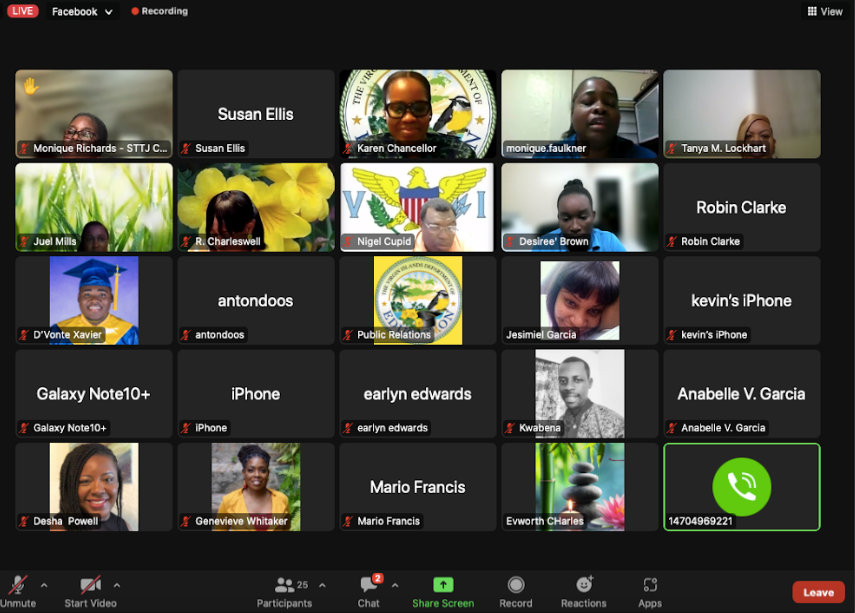
During an Education Department-sponsored virtual meeting Friday evening, administrators, instructors and students shared their thoughts and comments about career, technical and adult education programs in the Virgin Islands.
Monique Faulkner, the state director of Career, Technological and Adult Education for the department, moderated the workshop. She opened the meeting citing the July 2018 reauthorization of the Carl D. Perkins Career and Technical Education Act of 2006, which allows states more flexibility in administering their CTE programs to prepare students for high-skill, high-wage employment that meets the needs of the state and local workforce.
“This offers us in the Virgin Islands an opportunity to rethink and redefine our programs in high schools and adult programs in the territory, with you, the stakeholders,” Faulkner said. “We can take a serious look at whether our current CTE programs in our schools are effective. We can discuss whether they are preparing the students for the jobs available in the territory and will be available in the coming years.”
Juel Mills, St. Croix district director, was asked by Faulkner if she believes the current programs provided opportunities for careers such as work in social media and other new vocations. Mills didn’t answer but pointed out that many of the programs offer national accreditation, but most programs need to be expanded.
Some of the technology courses offered in the territory include welding, animal husbandry, auto and motorcycle repair, agriculture, pastry chef, mechanics, robotics, drone piloting, aerial filming, photography, nursing, childcare and winemaking.
Monique Richards, CTE district director for St. Thomas and St. John, said St. Thomas has similar programs, plus hospitality, finance programs, plumbing, electronics and cosmetology. Expanding the program would be good, but attracting students and professional instructors is crucial, she said. The lack of resources is a problem, she said.
Several participants recognized the workforce needs more workers than the CTE courses can provide. They also said innovative ways to hire instructors are needed. Some suggested academic teachers are needed as well as teachers who are trade professionals.
Robin Clark Thompson, CTEC childcare management instructor, said instructors also need to have studied special education and ethics.
Former culinary instructor at CTEC, Anton Doos, said he was not speaking on behalf of the CTE board, of which he is territorial executive director, but recommended reform in the program itself and in hiring teachers. Business owners, who need employees, are interested in teaching their trade for a few hours a day but do not want to be full-time teachers. He said the CTE board is working on a way to use part-time teachers, who may not be proficient in teaching Virgin Islands history — a required class for territorial students.
“The labor force in the Virgin Islands needs people now. Not tomorrow. They need people now,” he said. “The schools need to be rebuilt — we don’t have the labor force.”
Doos also said that many of the career and technology graduates go to the states to further their education and get work and they don’t return to the territory. The program isn’t successful unless the graduates stay home, he said.
Karen Chancellor, counselor at St. Croix Central High School, agreed with Doos that technical instructors should be judged differently and could work part-time for a stipend. If they own a business, students might have an opportunity for employment. She agreed instructors don’t need to be career teachers to teach their trade.
Faulkner added that people who need jobs don’t always have time to go to school. She said the virtual meeting is to begin making needed changes in the system. CTE programs don’t always prepare students for jobs available in the territory, she added.
Also speaking to the group, Annabelle Garcia, a St. Croix Career and Educational Complex senior who will graduate in culinary arts, spoke positively about her experience in the program. She said she has learned leadership skills and hospitality as well as food preparation.
Renee Charleswell, DOE’s deputy commissioner for curriculum, spoke toward the end of the session. She said that even though it has become difficult to find on-the-job opportunities, every child should have access to technical education if they want it. She added that counselors need to participate in advising students about careers and technical careers because the focus is usually about attending college.
At the end of the session, several participants agreed that vocational terminology needs to be changed. Career and technical should replace the word “vocational” when speaking of the program.
Editor’s Note: Anton Doos is the territorial executive director for the Board of Career and Technical Education, not president, as was stated in an earlier version of this story. That honer goes to Dr. Michael Francois.





